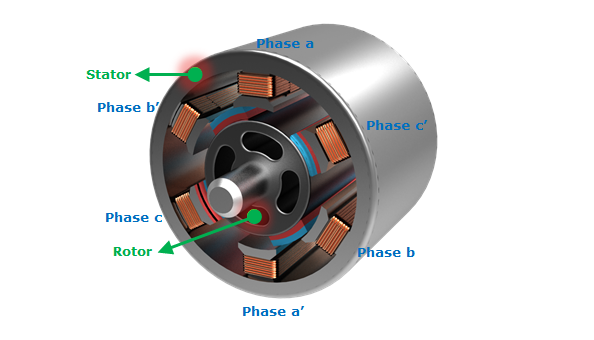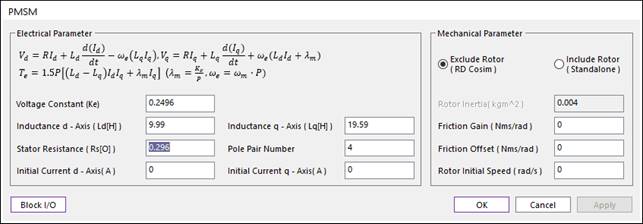
The PMSM block implements a 3-phases permanent magnet excited synchronous motor. This model assumes that the flux generated by the permanent magnets is sinusoidal, which implies that the electromotive forces are also sinusoidal. The DC machine block implements a series-connected or a shunt-connected DC motors.

Figure 1 PMSM Motor
Dialog Box

Figure 2 PMSM dialog box
Electrical Parameter
|
Parameter Name |
Signal |
Description |
|
Voltage Constant |
|
Voltage |
|
Stator Resistance |
|
Stator resistance. [ohms] |
|
Inductance d-Axis |
|
The d-Axis inductance. [H] |
|
Inductance q-Axis |
|
The q-Axis Inductance. [H] |
|
Pole Pair Number |
|
The number of pole pairs. In Figure2, the value of Pairs of Poles is ‘4’. |
|
Initial Current d-Axis |
|
Initial value of d-Axis current. |
|
Initial Current q-Axis |
|
Initial value of q-Axis current. |
Mechanical Parameter
|
Parameter Name |
Signal |
Description |
|
Exclude Rotor / Include Rotor |
|
Select the type of Motor between ‘Exclude Rotor’ and ‘Include Rotor’. The more detail explanation of two types is in the Mechanical Part of the Equation of PMSM. |
|
Rotor Inertia
|
|
Inertia of rotor. This parameter don`t need on the Rotor Speed Type. You can find the inertia of rotor in the datasheet. [kg*m^2] |
|
Friction Gain
|
|
Viscous friction gain between motor and load. When you apply the friction between the motor and the load in your dynamic model, you have to set this value to ‘0’. [Nms] |
|
Friction Offset
|
|
Viscous friction Offset between motor and load (B |
|
Rotor Initial Speed
|
|
Initial value of rotor speed. Set this value to ‘0’ if you don`t know it. [rad/s] |